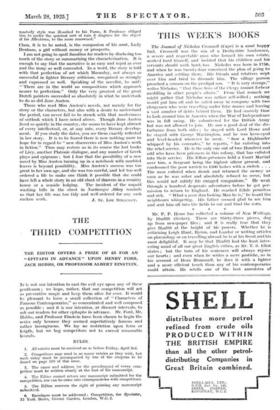THIS WEEK'S BOOKS
The Journal of Nicholas Cresswell (Cape) is a most happy find. Cresswell was the son of a Derbyshire landowner, a severe and respectable man who farmed his own estate, worked hard himself, and insisted that his children and his servants should work hard, too. Nicholas was born in 1750, and when he was twenty-four conceived the plan of going to America and settling there. His friends and relatives wept over him and tried to dissuade him. The village parson preached a sermon on the prodigal son. " It is very strange," writes Nicholas, " that these Sons of the Clergy cannot forbear meddling in other people's affairs." From that remark we might gather that Nicholas was rather self-willed ; nothing would put him off and he sailed away in company with two clergymen who were travelling under false names and leaving a vast number of debts behind them. He had scarcely time to look around him in America when the War of Independence was in full swing. He volunteered for the British Army but was not allowed to join. He saw a good deal of the dis- turbance from both sides ; he stayed with Lord Howe and he stayed with George Washington, and he was keen-eyed and level-headed wherever he went. " Saw a Highlander whipped by his comrades," he reports, " for enlisting into the rebel service. He is the only one out of two Hundred and odd who have been prisoners in this colony, that has enlisted into their service. His fellow-prisoners held a Court Martial over him, a Sergeant being the highest officer present, and condemned the poor wretch to 1500 lashes with a switch . . The man enlisted when drunk and returned the money as soon as he was sober and absolutely refused to serve; but this would not satisfy his enraged companions." He went through a hundred desperate adventures before he got per- mission to return to England. He reached Ethic penniless and sick. " What a poor dun looking Man he is," lie heard the neighbours. whispering. His father seemed glad to see, him and sent him off into the fields to cut and bind the corn.














































 Previous page
Previous page